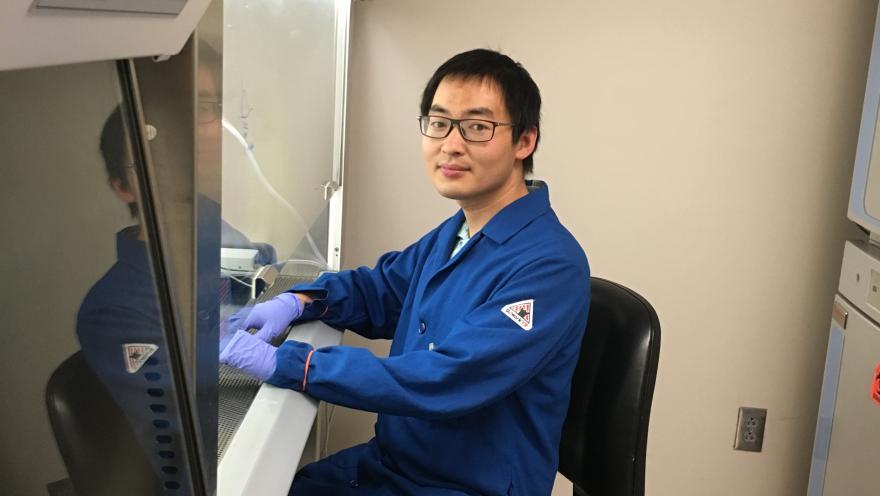The ALS Association is happy to continue our tradition of supporting bright, young scientists in ALS research through our Milton Safenowitz Postdoctoral Fellowship Program. These awards encourage young scientists to enter and, importantly, to remain in the ALS field.
We are proud that 90 percent of our funded postdoctoral fellows go on to start their own ALS research labs and continue to mentor more young scientists, further adding innovative ideas to the field.
This year we are supporting six new postdoctoral fellows out of a highly competitive applicant pool. This is the second in a series of six articles highlighting the dedication and unique contribution each fellow makes to ALS research, while getting to know the person behind the lab coat.
Today, we sit down with Dr. Yue Li from Scripps Research Institute – Florida to learn about his important research project studying how specific RNA-protein interactions contribute to ALS disease.
Yue Li, Ph.D.
Scripps Research Institute – Florida
Mentor: Dr. Matthew Disney
Project: Development of RNA-templated small molecules to treat C9 ALS/FTD
What is your message to our generous donors?
Thank you to The ALS Association donors and Safenowitz family for your generosity in funding my fellowship. I am extremely honored to be one of the select few recipients of the award this year. With your support, I will be able to continue my studies on RNA and ALS in the Disney Lab at Scripps.
Briefly describe the goals of your funded research project.
My research goals are developing small molecules as pre-clinical candidates and diagnostics targeting the C9ORF72 (C9) expansion mutation, which is the most common cause of inherited ALS. We know that the C9 repeat expansion mutation contributes to ALS-derived toxicity of motor neurons, the cells that die in ALS. We have established screening methods to identify lead compounds from thousands of compounds and aim to discover small molecules that bind to the C9 expansion in cells to alleviate disease-related symptoms.
What is the impact of your research on the ALS community?
The research is platformed on previous studies and has a promising outlook. Our novel approach to treating ALS aims to develop highly selective inhibitors for an intractable disease. This proposal brings new and exciting research for the development of novel therapeutics and diagnostic tools to the ALS community.
Why did you choose to focus on ALS research? What do you like about working in this field?
I joined Disney Lab as a postdoc fellow and the RNA repeat research here is similar to my Ph.D. study, which targeted Alpha-thalassemia mental retardation syndrome (ATRX), which is also caused by excessive DNA repeats. I am very interested in the structure of nucleic acids, which are the building blocks of RNA and DNA. I would like to develop small molecules specifically targeting the structure of DNA or RNA for the treatment of diseases, with a focus on ALS.
Tell me something unique about yourself.
I grew up in China, took my Ph.D. in Japan, and now do research in the U.S. as a postdoc. It is a wonderful experience living in three different countries.
Click here for more detailed information about Dr. Li’s project.
The Milton Safenowitz Postdoctoral Research Program falls under our TREAT ALS Global Research Program and was founded by the Safenowitz family through the Greater New York Chapter of the Association. Mr. Safenowitz died of ALS in 1998 and the family and chapter continues its support to this day. Each award is for $100,000 over a two-year period.


Join the conversation. Please comment below.